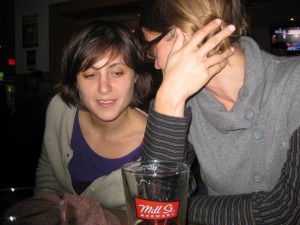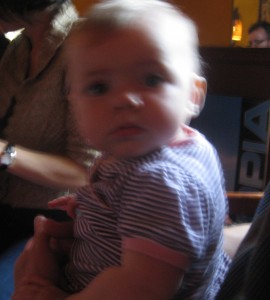What I say to a close friend is quite different from what I say to a distant acquaintance or to my boss, even if I’m describing the same situation. When I speak to a friend, I will, of course, relate parts of the story that I keep private from the others. More than that, though, my very words will communicate the trust we share and the emotional warmth I feel for her, without those themes having to be spoken about explicitly. In an analogous way, a server at a restaurant can make me feel uncomfortable and communicate his displeasure with me while never straying at all from communication with me that is formally quite polite. These situations remind us of two things. 
First, the description of a situation is never automatic–never a matter of simply correlating the correct word with the relevant fact. On the contrary, our descriptions are always interpretive. In other words, the way we choose to talk about something will always reveal something about us–the speakers–by revealing what aspects of the situation we deem relevant.
Second, our words will also always say something about that one to whom we speak. In the way we choose to speak, that is, we “say” who we take the other to be. In my example above, I implicitly tell my friend that she is my friend, even as my words explicitly only describe some event at the office.
 Before we are adults, we are children. When we are adults, we can endure the implicit snubs and put-downs, and, indeed, the implicit flattery, that our conversational companions direct at us in the power-plays that typically shape our interpersonal lives. When we are children, however, we have not yet built up the secure sense of self-identity that allows the adult to know who she is despite the images of her that are projected upon her through the speech of others. Indeed, it is precisely through such projections, such implicit portrayals of self-identity, that the child comes to form a sense of who she is in the eyes of others.
Before we are adults, we are children. When we are adults, we can endure the implicit snubs and put-downs, and, indeed, the implicit flattery, that our conversational companions direct at us in the power-plays that typically shape our interpersonal lives. When we are children, however, we have not yet built up the secure sense of self-identity that allows the adult to know who she is despite the images of her that are projected upon her through the speech of others. Indeed, it is precisely through such projections, such implicit portrayals of self-identity, that the child comes to form a sense of who she is in the eyes of others.
We should be very careful in our conversations with our peers to ensure that our implicit communications behind our explicit words are fair and respectful. Even more so, as parents, care-givers, educators and friends, we should be extremely careful of the way that our interactions with children are telling them who they are, whether or not this is the message we intend to be sending.
Our contemporary society encourages us to accept the myth the we are independent, self-contained individuals from start to finish. In fact this interpretation of human nature is not true. Our very sense of “self” is accomplished in and through our language. We are not independently formed minds who simply use an external language as a tool to pass information to other independent minds. On the contrary, we become individuals only in the context of being partners in dialogue.


 Participants in these
seminars consistently have the experience of growth in their conversation and
conceptual abilities, and typically leave with a transformed sense of the nature
and possibilities of philosophy.
Participants in these
seminars consistently have the experience of growth in their conversation and
conceptual abilities, and typically leave with a transformed sense of the nature
and possibilities of philosophy.





3 Comments
When I was visiting my family recently, an episode of the need to talk at different registers occurred, but unfortunately I only realized this too late. It seemed like a fairly silly issue. There was a stamp that produced a confusing looking bug. My sister and her five year old daughter, Olivia, were calling it a spider. I said I thought it was an ant. Soon, a whole room of adults were chiming in. I became quite adamant about it not being a spider, given that it did not have eight legs, and it did have an articulated body. Little Olivia was surrounded by adults who were rather enjoying the debate, but in fairly loud and energetic terms. There was a great deal of wit being tossed around that would not have been understandable to a child. Suddenly, Olivia was crying…sobbing. Eventually, she was able to ask her mom, But, mommy, aren’t I right that it is a spider? We steered the conversation toward the idea that we all can be misinformed about things, make mistakes, etc. But, what I realized is that that is not how she first heard her “error.” Indeed, I can’t even be sure what she did hear altogether; but, I can think back about ways in which she must have heard me (and others) saying rather bluntly and hotly that there was no way that thing was a spider. It could have felt humiliating to her. It certainly was not the way in which I would have talked to or with a child. But, in the moment, I had pulled away from her as the context (or even part of the context), and had begun speaking on adult terms, and particularly in a style of playfulness that I could easily and comfortably take up with those present. I knew they wouldn’t think I was questioning their intelligence at a deep level; it was simply in our world a silly stamp, made by a company that really didn’t do a good job (in all of our adult opinions) of representing any clearly defined insect. In any case, I realize just how easy it can be to fail to adjust one’s register when in conversation, especially in the company of conversants of many different kinds.
This is such a wonderful post. It has made me think about how the different contexts I inhabit play a significant role in my relations with others. I have noticed that when I try to describe a situation to someone, or tell someone a story, I often leave out key aspects of that story, while expecting the person to ‘know’ those details. For example, I might tell an acquaintance that ‘someone in the coffee shop’ said something pleasing about me. As you explained so well in the blog post, my statement communicates a lot about my experience of my own identity. Through my statement I present myself as someone who values the opinion of certain others, and I also communicates my sense of my acquaintance as someone who can relate to my story one way or another. This insight makes me wonder how noticing what I leave out can show me what different attitudes I can adopt when talking to others.
When I tell someone about what happened at the coffee shop, I have a developed sense of the kinds of people who hang around there. The significance of what that coffee shop person said is importantly determined by my sense of the type of people who hang around that particular coffee shop. When I tell my story but leave out an account of my understanding of who hangs around the coffee shop, and why that contributes significantly to the meaning of what was said to me, I can see that I assume many things about my interlocutor. I assume she knows the coffee shop to which I refer and has a sense similar to my own of the people who hang around there. If I am correct about these assumptions, I communicate to her that we have contexts in common and thereby share in a certain perspective on the significance of what occurs in those contexts. If I am wrong, then not only have I failed to communicate what I intended to communicate, but I may also have shown myself to be entirely unaware of important differences between us, and to therefore be closed to the reality of her own distinctive perspective. These are not things I want to communicate about myself, and this is not an attitude I want influencing my interactions with others. I will have to be careful about the kinds of assumptions I make.
Language acquisition is probably an initiation for children to quite a new level of making mistakes. Mistakes in language may seem formal and unsubstantial, unlike breaking a vase or hurting somebody. And yet, as you suggest in your post, language acquisition seems to shift the child’s notion of what counts as substantial. (Similarly, I remember you talking, in the context of Plato’s “Republic”, about the importance of the child’s initiation into the mode of truth in mathematics.)
I think this is very fascinating in itself and don’t have much to say. But Kirsten’s story about her 5 year-old niece being extremely nervous by mistakes, made me think of a tangential story about my 4 year-old nephew. So, my nephew, Nesim, is in his “Why?” phase: “Why is Austria close and Turkey far away, mommy?”, “Why is the pool blue, mommy?”, “Why did I dream yesterday?”, “Why are ants small?” etc. So one day, my sister and Nesim were looking for a bus stop. Nesim thought it was on the right, my sister on the left. They went right, the bus stop wasn’t there; they went left and saw the bus stop. My sister told him: “See, you were wrong after all.” Nesim so candidly asked: “Why was I wrong, mommy?”